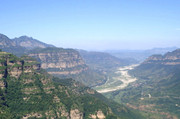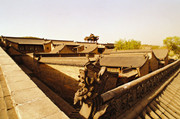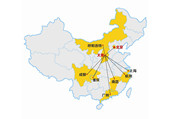Tashan set to be model for China's mining industry
By Han Tianyang ( China Daily )
Updated: 2012-07-09
|
Datong Coal Mine Group celebrated its recent 60th anniversary with a huge and colorful fireworks display. |
November 11 was a big day for workers and management at the Tahsan coal mine, the largest and most advanced mine owned by the Datong Coal Mine Group (Tongmei). On that day, the mine completed the extraction of its 15 millionth ton of coal for the year, seeing it hit its annual target some 50 days ahead of schedule.
With its cutting-edge mining equipment, the mine only has 800 members of staff, an astonishing figure that means, on average, they each produce nearly 20,000 tons of coal per year.
Previously an open seam in a mine needed up to a hundred people to work on it, but the same seam in Tashan needs only 20 people or less to operate the machinery, according to staff.
As for Tongmei, its achievement at Tashan marks its latest contribution to the economic good of the country. Since the foundation of its predecessor, the Datong Mining Office back in 1949, Tongmei has contributed a total of 1.7 billion tons of coal as fuel for China's economic development. From 2005 to 2008, the annual coal output of Tongmei was over 100 million tons for four successive years.
China has the world's largest, but most fragmented, coal industry. In accordance with directives from central government, a new round of coalmine consolidation has been initiated throughout the country.
As one of the 13 major coalmine groups covered by the national plan, Tongmei will take over 111 coal mines in Shanxi province and restructure them into 47 new sites. Adding the 54 mines Tongmei has already managed, it will give the company a total of 101 mines.
So far, Tongmei has already taken over 43 mines, with the resumption of mining having begun in 10 of them. The remainder of the mines will shortly be in Tongmei's hands and work at all of them will resume at once, according to Wu Yongping, president of Tongmei.
The added mines will increase the company's capacity by 34.2 million tons per annum, he said.
Wu said: "This consolidation is a strategic decision by the government. It will help to better exploit and use coal resources and will also help to raise the safety level of coal mines in the long term."
Outside the Shanxi province, Tongmei acquired two strip mines in the Inner Mongolia autonomous region - Zhaofu and Huafu, with an annual capacity of 2.4 million tons. As part of a joint venture with the China Minmetals Corporation, Tongmei also acquired a coalmine in Erdos, which is said to have coal reserves of 1 billion tons.
According to Wu, Tongmei has extended its businesses to overseas territories as well. The group has now undertaken a coalmine construction project in Turkey and a coke oven plant project in Bhutan.
In addition to coal mining, Tongmei also works in several other related industries, including power generation, chemical engineering, metallurgy and mechanical manufacturing. Wu said: "We aim to build a competitive and comprehensive energy group, providing a diverse range of products."
The electricity field is one that the group has already entered. Wu said the official opening of the Datang-Tashan mine-mouth power plant last year marked the beginning of a program of coalmine operators expanding into the power generating industry.
In terms of chemical engineering, the group has opened a methanol plant and will launch an alumina project in the near future, in order to make the best use of its existing coal resources.
Tongmei is also working in association with the Shougang Group, one of China's major steel members, on a steel plant with a current annual capacity of 800,000 tons. By 2012, this capacity will increase to 2 million tons, generating 6 billion yuan in revenue.
In a bid to cut its machinery purchasing cost and to boost its overall competitiveness, Tongmei has launched a manufacturing company and now makes it own large-scale coalmining machines.
Wu predicted that, by 2012, the sales income from Tongmei's non-coal businesses will amount to 15 billion yuan. By then, the group's total sales of coal will have increased to around 200 million tons, bringing a revenue of 60 billion yuan, he said.
Wu said: "Non-coal businesses can not only enrich our product range, expand our income sources and improve our capability to weather market risks. It also enables us to form a recycling system and make Tongmei a 'green mining' company, with relatively low emissions and little waste."
"Green mining" means that the company exploits not only coal but also methane gas and associated minerals, while reducing the damage to the environment as much as possible, said Wu.
Wu said: "The two most important elements of green mining are safety control and recycling. Safety control is the essence of coal mining, and recycling is a basic requirement when exploiting natural resources."
Wu cited Premier Wen Jiaobao who recently expressed his best wishes for the company and its future development, saying: "As the world's largest coal mining industry, China should have the most advanced mining technology, equipment and talent."
Wu said he hoped that the green mining they are pioneering in Tashan will help to change the public's stereotyped view of the industry as "dirty and dumb" and set up a model for the sector's sustainable future development.
(China Daily 12/01/2009 page15)





